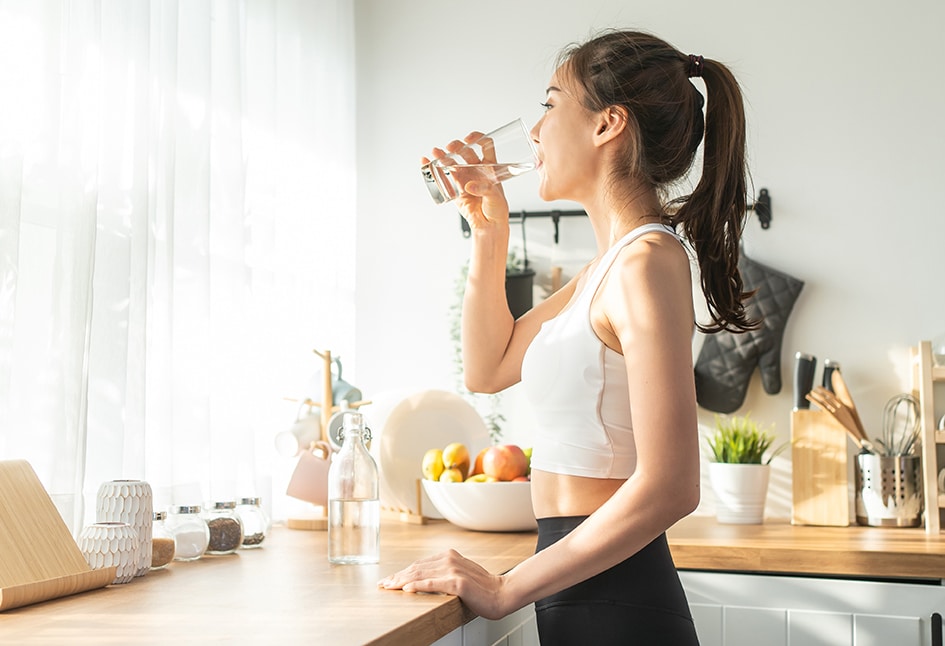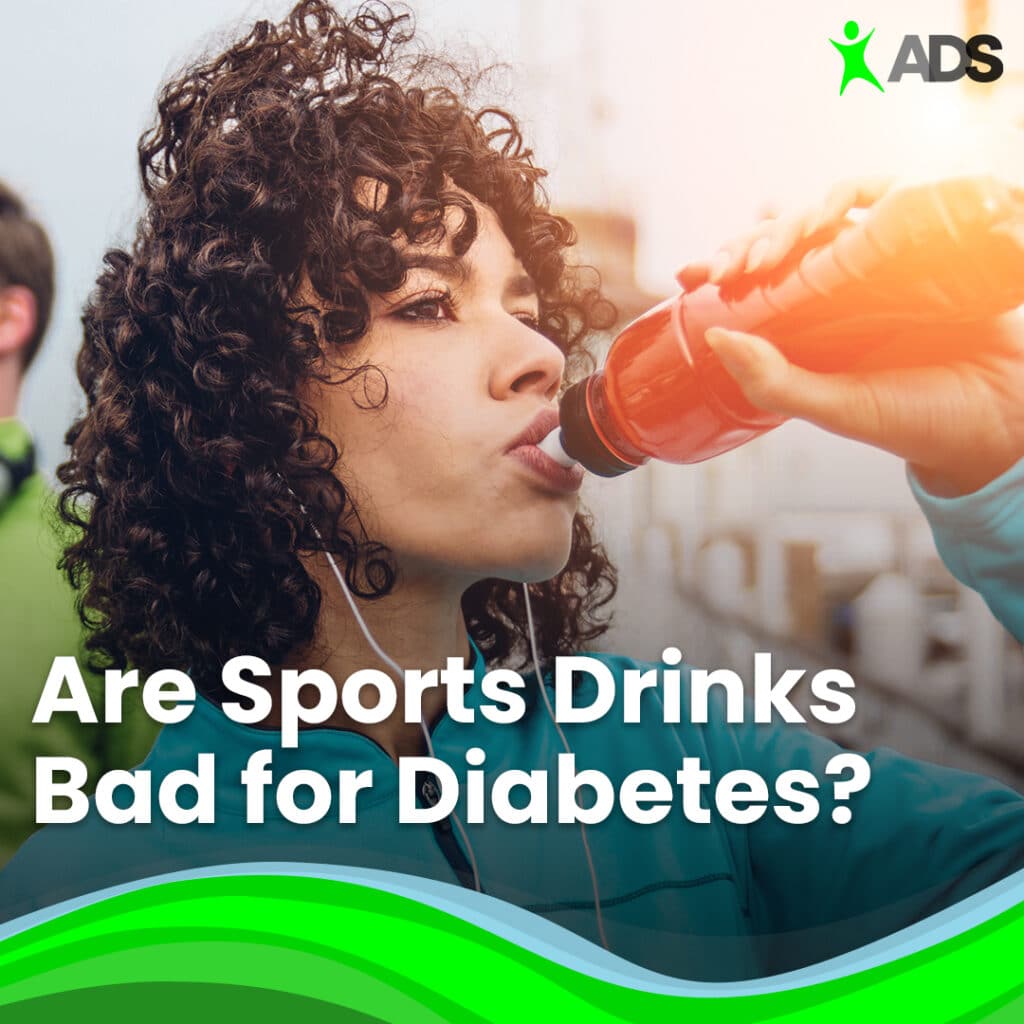
The topic of sports drinks for diabetics can be complicated and confusing. Get the facts—and advice on safe sports drink consumption—from ADS.
It’s no secret that Gatorade, Powerade, and other sports drinks are popular. In 2021, US residents drank 3.3 liters of these beverages per capita—a figure expected to rise to 3.6 liters by 2027. But while these drinks can help athletes quickly get hydrated while replenishing electrolytes, they’re also full of sugar and carbohydrates.
If you’re wondering “can people living with diabetes drink sports drinks?,” the answer is “maybe.” Living with diabetes can make it more difficult for you to enjoy these beverages, but you might not have to completely cut them out of your life. For more advice, read on for ADS’ comprehensive guide to sports drinks for diabetics.
Are Sports Drinks Bad for Diabetes or Pre-Diabetes?
It’s tempting to say sports drinks are never a good choice for people with diabetes, but the truth is more complicated than you might think. You’ll need to consider a few factors before making an educated decision on this subject.
Since they contain carbs and electrolytes, sports drinks are ideal for maintaining hydration during extended workouts like lengthy hikes and long-distance bike rides. Moderate amounts of these beverages can also keep your blood sugar steady. One research study suggests that sipping sports drinks might help adolescents with type 1 diabetes avoid hypoglycemia while exercising.

But sports drinks are also packed with carbohydrates, calories and sugars so you definitely don’t need to drink them every time you work out. In that sense, at least, the question “are sports drinks bad for pre-diabetes/diabetes?” can be answered in the affirmative. For hydration during “normal” workouts and everyday life, stick to a zero-carb, zero-calorie option—good old H2O! The goal is to stay consistently hydrated by drinking a minimum of 64 ounces of water each day—more if possible, and then to supplement with additional water when you are sweating heavily, spending time in the heat or exercising.
Are Sports Drinks Actually Sugar Free?
Generally speaking, sports drinks are not free of sugar. The average sports drink contains 6 percent carbohydrates—“6 percent” being the amount of sugar vs. the amount of water in these beverages. For example, both Powerade and Gatorade have higher amounts of carbs with 25 grams of carbs per 12-ounce bottle.
Of course, not all sports drinks contain this much sugar. It’s also easy to find sugar-free sports drinks made with artificial sweeteners. These beverages are lower in calories and carbs than non-sugar-free options while still containing some electrolytes.
Despite this, it’s worth noting that people with diabetes shouldn’t include huge amounts of artificial sweeteners in their everyday diets. Excess consumption of some sweeteners in this category may come with adverse long-term health effects.
The Best Drinks: Expert Recommendations
If you’re going to consume sports drinks while managing diabetes, it pays to know what you should focus on—and what you should avoid. Here are a few recommendations.
- Water. For “normal” hydration, you simply can’t beat water. If you’re looking for a bit of flavor, try making infused water with berries, citrus, cucumber or mint.
- Coconut water. Do you want a natural hydration option that contains electrolytes? Consider unsweetened coconut water—a cup of this beverage includes 46 calories and 2 grams of protein. And while it has 6 grams of (naturally occurring) sugar, the 2 grams of fiber found in coconut water helps to offset this.
- No Added Sugar Orange juice. OJ might not normally be synonymous with hydration, but this beverage also contains natural sugar—20 grams per cup, to be precise. To reduce this sugar level, steer clear of orange juice brands with added sugar and consider diluting your juice with water.
- Gatorade Fit. Nowadays, it isn’t too difficult to find more diabetes-friendly sports drink options from mainstream brands. Gatorade Fit contains a single gram of natural sugar, 15 calories, zero added sugars or artificial sweeteners, and your complete recommended daily value of vitamins A and C.
- Power Water. This is Powerade’s line of zero-calorie, sugar-free sports drinks for people living with diabetes (and anyone else looking for a lighter sports drink option). Power Water also includes vitamins B3, B6, and B12.
- SmartWater. For those looking to hydrate while avoiding sodium, SmartWater provides calcium, magnesium and potassium with no sodium, no sugar, no calories and no artificial colors.
Avoid These Sports Drinks
On the other hand, people with diabetes should steer clear of these sports drinks which can affect your blood sugar levels (unless they’re planning an extended workout):
“Traditional” Gatorade/Powerade. On average, both of these drinks contain 34 grams of added sugar and 140 calories per 20-ounce bottle. To give you some perspective on that amount, the recommended daily maximum for added sugar is 25 grams.
VitaminWater. This product’s name might sound nutritious, but the truth is more complicated and the product is high in sugar. A 20-ounce bottle of VitaminWater Refresh comes with 100 calories and 27 grams of added sugar.
Liquid I.V. Unlike the other products discussed in this article, this isn’t a pre-packaged beverage—it’s an electrolyte drink mix. But while it’s promoted as a lower-carb alternative to “classic” sports drinks, it still contains 11 grams of added sugar.
What to Look for in a Sports Drink for Diabetes Management
The lists above should give you a sense of what to look for when trying to find the best sports drink for people living with diabetes, but they’re far from comprehensive. If you want to try a sports drink not included on either list, it should:
- Be free of added sugars and low in calories and total carbohydrates
- Contain minimal artificial sweeteners
- Be an effective source of hydration
- Include important vitamins
Things To Consider About Drinking Sports Drinks
So, are sports drinks bad for people living with diabetes or not? As you can see, it’s not impossible for people with diabetes to safely enjoy sports drinks. These beverages can provide a quick source of carbohydrates during lengthy exercise routines and help you get electrolytes when you need them.
However, you should balance these advantages with the drawbacks associated with combining sports drinks and diabetes. Most notably, these beverages are high in carbohydrates by design—and because of that, they shouldn’t be a regular part of any diabetes diet. Even if you only occasionally consume sports drinks, you’ll need to ensure the carbs they add to your diet don’t prevent you from hitting your target blood glucose levels.
Understanding the Glycemic Index of Sports Drinks
To truly understand the impact sports drinks can have on your blood glucose, you’ll need to look at more than the grams of sugar they contain. It’s also wise to consider where these beverages rank on the glycemic index (GI) scale.
Put simply, a food or beverage’s glycemic index is a measurement of how rapidly it causes a person’s blood sugar to increase and how large of a spike it creates. If a food item is low on the GI scale, it releases glucose slowly and steadily. Conversely, high-GI foods rapidly release glucose into the bloodstream.
As you might expect, low-GI foods are optimal for people with diabetes due to their limited impact on blood sugar—and sports drinks for diabetics fall squarely into the high-GI category. You should be aware of their potential effects these drinks have on your blood glucose and take steps to deal with this impact.
Tips for Managing Blood Sugar While Consuming Sports Drinks
Taking everything above into account, here are some tips to control your blood sugar while drinking sports drinks, try to:
Count carbs. Unless you’re solely drinking water, even the best sports drink for people with diabetes could contain a few carbs. The trick is to make sure these carbohydrates fit into your diet as a whole by taking carb counting seriously.
Drink small amounts of these beverages. The difference between gradually sipping on a sports drink and drinking an entire bottle can be much more significant than you might think. As is the case for other carbs, moderation is key. Or consider drinking plain water instead.
Stay hydrated with vegetables. Natural, whole foods have the highest water content. Fruit and vegetables contain 80 to 98 percent water. Eating dense vegetables such as cucumbers, tomatoes, broccoli, jicama, carrots or celery with a meal or snack is an easy way to improve your hydration.
Get the right carbs. Obviously, sports drinks shouldn’t be the only way you get carbohydrates. Ensure that whole grains are the primary source of carbs in your diet, especially whole-grain products rich in fiber.
Check your glucose levels regularly. It’s always in your best interest to know where your glucose levels are at, even if you aren’t consuming sports drinks. Traditional glucose meters and continuous glucose monitoring systems can both help in this regard.
Along with these pieces of advice, we’d encourage you to energize your diabetes treatment plan by finding a reliable company for your diabetes supply needs. When you purchase supplies through ADS, you’ll benefit from the best turnaround times in the industry and highly personalized customer service. Take the first step by visiting our online store today!
